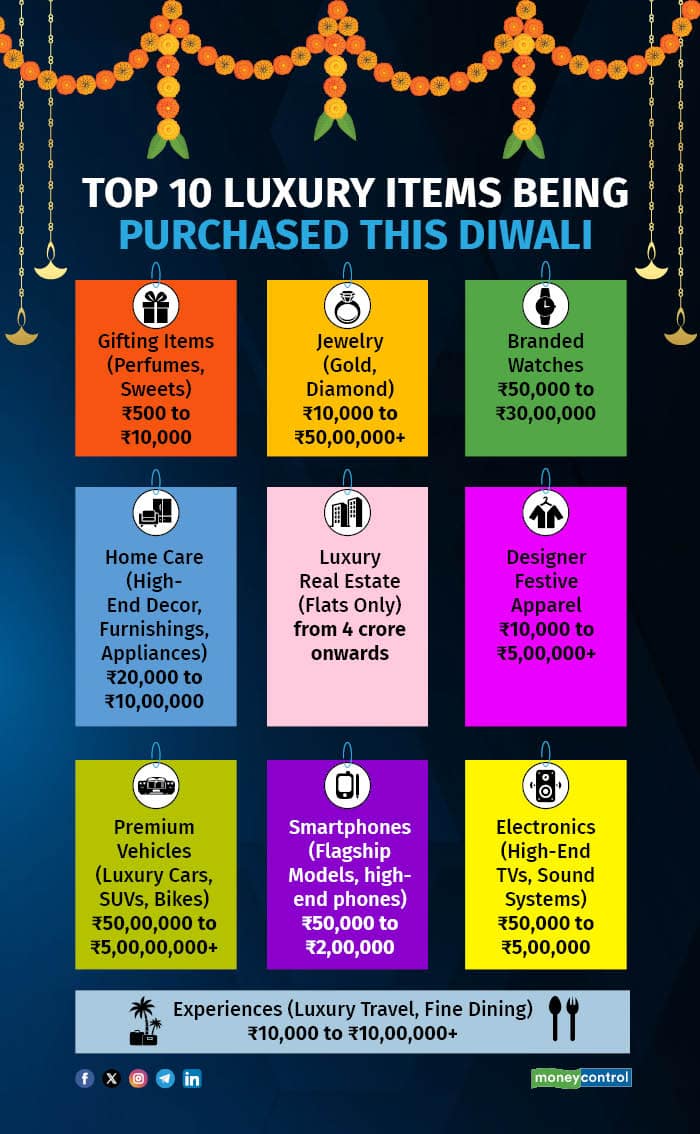



Consumer spending peaks during Diwali, the pan-India festival of lights. This year, too, is no exception.
Demand for premium products has remained robust. There has been a spike in purchases across sectors — from FMCG (fast moving consumer goods) to automotive and real estate —underscoring an ongoing shift towards high-end consumption. From luxury vehicles to designer diamonds, with luxury watches and electronic goods thrown in for a good measure, companies are reporting a festive season sales boost, driven by an increasing consumer appetite for upscale purchases.
Despite high headline inflation — primarily due to price rises in essentials commodities such as food, groceries, and durable goods — consumers have remained resilient in their shopping plans, with luxury brands reporting steady sales growth.
Inflationary pressuresIn September, the Consumer Price Index (CPI) inflation rate rose to 5.49 per cent, up from 3.65 per cent in the previous month, largely due to higher food prices, with food inflation alone reaching 9.24 per cent, up from 5.66 per cent in August.
 Top 10 luxury items being purchased this Diwali
Top 10 luxury items being purchased this DiwaliIn the lifestyle and apparel segments, Tata Group-owned Westside has reported a marked increase in demand across all categories, while the gold jewelry market is also seeing a sharp rise in demand, despite historically high prices for the ‘yellow metal’ due to ongoing geopolitical tensions in the Middle East and the Russia-Ukraine conflict.
Strong demand for gold and diamondSeveral high-end jewellery makers told Moneycontrol that consumers are investing in both traditional gold jewellery and premium diamond pieces during October, which is considered to be an auspicious time to buy gold per the Hindu custom and also marking the start of India's wedding season.
According to M.P. Ahammed, chairman of Malabar Gold, the festival season has driven strong demand for gold, a safe haven asset for consumers. “Festivals like Diwali and Dussehra are significant occasions for purchasing gold. We have seen heightened interest this season, particularly in fancy-cut diamond items,” Ahammed said.
Ramesh Kalyanaraman, Executive Director at Kalyan Jewellers, said Dhanteras — the first day that marks Diwali — saw a steady footfall, with consumer preferences striking a fine balance between tradition and modernity. “Conservative buyers are opting for Shagun coins, while younger shoppers are showing interest in lightweight 18 carat jewellery pieces,” Kalyanaraman said.
Kalyanaraman anticipates a steady rise in sales through the festive season amid expectations of the momentum picking up during the "muhurat", or the auspicious period.
Similarly, another Tata Group-owned company, Titan’s jewellery division, encompassing brands such as Tanishq and Mia, has flagged strong demand, particularly in the southern and eastern parts of the country. Though sales accelerated since Navratras, the peak occurred during Dussehra and Karva Chauth. Ajoy Chawla, Chief Executive Officer (CEO), Titan’s jewellery division, cited that despite record-high gold prices, demand has remained resilient across regions.
Boost for automotive salesAutomotive sales have also experienced an upswing, especially in premium and hybrid models, indicating a consumer shift towards more advanced offerings. “We are seeing increasing interest in premium models and hybrid vehicles,” said Saket Mehra, Auto & EV Industry Leader at Grant Thornton Bharat. Leading automaker Maruti Suzuki reported “very good traction” in both urban and rural segments, with festive-period sales already reaching 300,000 units— a 14 per cent year-on-year (YoY) increase.
According to Manish Raj Singhania, former president, Federation of Automobile Dealers Associations (FADA), the festive season has provided a much-needed boost to two-wheeler and passenger vehicle sales, as retail numbers improved on a YoY basis. “We derive up to 30 per cent of our annual retail sales during the festive season. With OEMs [original equipment manufacturers] and dealers rolling out numerous discount schemes, customers are advancing their purchases,” Singhania said. Vahan data showed around 17 per cent increase in two-wheeler registrations this month, along with a 10 per cent rise in passenger vehicle sales.
Fillip to realty sectorIn real estate, a notable demand surge has been observed in new residential projects, particularly in metropolitan pockets such as East Bengaluru, Thane, Navi Mumbai, Gurugram, and Noida. Saurabh Garg, co-founder of NoBroker, a Benguluru-based brokerage-free proptech company that provides real estate services under a marketplace, pointed out that that consumers are increasingly viewing real estate as a valuable physical asset amidst rising prices. “There’s been a marked increase in demand for new developments as buyers recognise that prices could rise significantly by the time projects near completion,” Garg said. Following a subdued second quarter, which ended on September 30, he noted that consumer interest in real estate has strongly rebounded.
Across sectors, the festive season has proven a critical driver of demand, with consumers gravitating toward premium purchases and durable investments, showing resilience and a strong appetite for aspirational buying, despite inflationary pressures.
Discover the latest Business News, Sensex, and Nifty updates. Obtain Personal Finance insights, tax queries, and expert opinions on Moneycontrol or download the Moneycontrol App to stay updated!
Find the best of Al News in one place, specially curated for you every weekend.
Stay on top of the latest tech trends and biggest startup news.